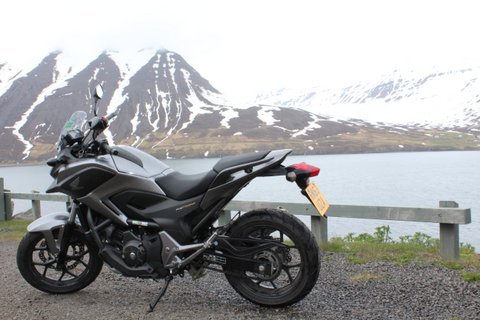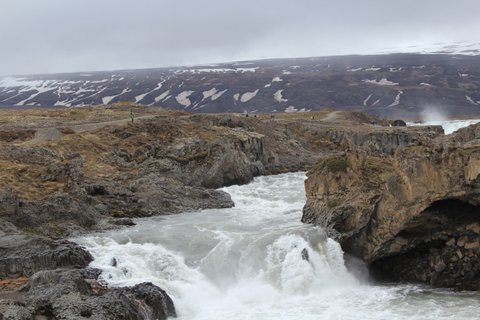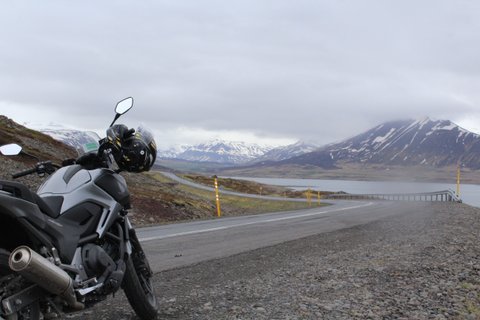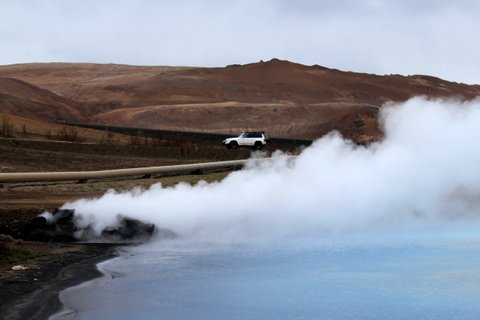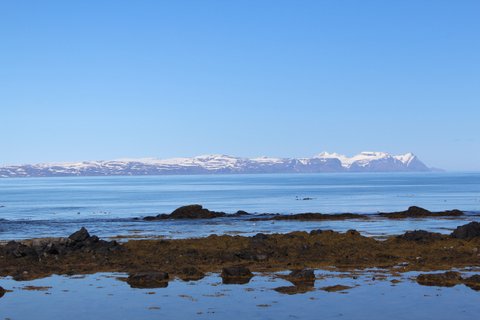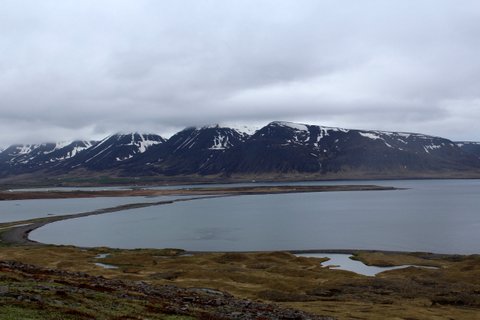Northern exposure - Episode two
Riding a motorcycle through the land of ice and snow
John Newman
My introduction to Iceland's geography from the wind blasted deck of the ferry was spectacular, but before long there would be much more to startle the senses, beginning with the road leading out of Seydisfjordur: a series of bends winding ever upwards towards the snowline.
My German cabin companion riding the Transalp had put on base layers in preparation for his departure. I pointed and remarked that it was not that cold. He understood but just gave a knowing smile...he'd travelled here before.
There were three cycles tucked away on the car deck, and as I steered the Honda up the road between the dark mountains towards the snow fields I passed these unfortunate pedallers, stalled in their efforts to make progress and pushing their machines. It must have been about fifteen kilometers before the road began to drop down into the nearby town of Egilstadir...perhaps they've made it there by now.
Icelandic towns outside Reyjavik are small, and once you leave them, the N1 Ring is a good surfaced road, you experience a wild, mountainous, austere but majestic country and virtual isolation: just a handful of vehicles are going in the opposite direction. Iceland is a new country exploding out of the sea around 16 – 18 million years ago: the blink of an eye in geological terms. It forms part of chain of massive historic volcanic activity in the Atlantic which includes the Canary Islands, Madeira, the Azores and Bermuda etc.
I was in awe of the landscape as the kilometres passed under the wheels, but the wind was roaring in my helmet and pushing the bike where I didn't want it to be, and all the while it was lowering my body temperature. At one point crossing what was in effect a desert of lava I saw a cloud of dust in the distance. It was steam. I was watching volcanic activity leaking up through the earth's surface.
The cold earth slept below
There's only one place to stop between the town of Egilstadir and my destination Akureyri; a small tourist halt named Reykjahlid. A helpful Icelander helped me operate the self service petrol pump and with some relief I parked up outside a cafe/bar attached to the small hotel. Warmth. I disrobed, sank into a chair, stretched the legs to relieve the knees and before long I was sipping tea and tasting a fillet of salmon with trimmings. So fresh it must have leapt from the river to the grill.
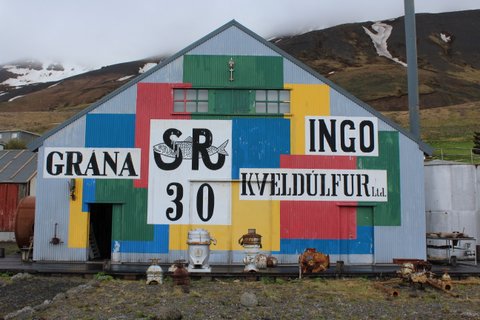
The Honda and I had lived with each other for about a thousand miles at this stage. The NC750X engine is a beefed up version of the NC700, based on the Jazz car engine and boasting exceptional fuel consumption of 70/80 miles per gallon. They've installed an additional balancer shaft in this model, and it does deliver smooth power. At 80mph in sixth gear it's humming along at four thousand revs. Selecting the automatic mode for gear box (see part one 29/6) helps to conserve fuel. The whole unit is flexible and torquey, and the automatic mode keeps the bike running in as high a gear as possible.
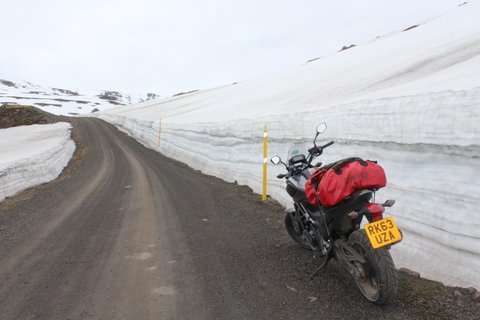
I'm finding the bike comfortable and easy to manage. It's lithe and weighs out at just 219kgs. At 830mm my short legs can cope with the seat height, which will be important when I take to the gravel roads/tracks. As will be the performance of the Pirelli Scorpion tyres. Part of the 'family' of deep cut tread tyres the various companies have developed to be fitted to the 'adventure' style bikes the manufacturers are offering us.
The under seat tanks is small at a fraction over 14 litres, but it should carry you for around 200 miles before a refill is needed. I found myself stopping for a stretch before I ran close to empty, and having to unstrap my single bag luggage from the pillion seat soon became routine. Consumption returns might be less if you engage sport mode for any distance, but so far I'd just tried the manual change buttons as I ran up the east coast of Denmark on smaller roads. I must admit it felt strange and not easy to judge bends and roundabouts initially (more practice needed). But I did find myself using the handlebar control to drop down a gear or two if overtaking or needing more uphill power.
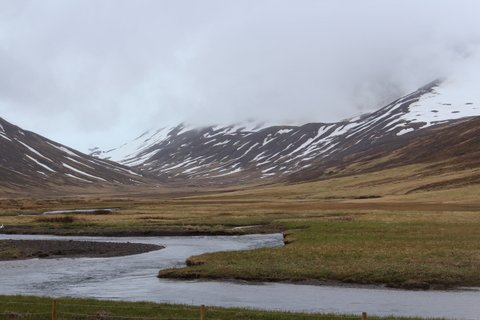
The town of Akureyri sits on the south east corner of the Trollaskagi peninsular. One of several in northern Iceland; like stubby fingers poking into the Greenland Sea. The small road running around its perimeter promised a stark panorama of mountainous coastline and fjord inlets, and the northernmost town Siglufjordur would be the nearest point to the Arctic Circle I'd reach.
Above the cold sky shone
The weather portents were not good. As I returned to my accommodation with breakfast supplies from the town bakery, the digital thermometer showed 5 degrees. These thermometers are a regular feature on the roads, and often show the valley and high plateau/mountain pass temperature differences. They became an important feature in my brief Iceland life.
I rode forth regardless under greying skies that were leaking drizzle. But by the time I'd reached the first small village called Dalvik it had progressed to proper rain. Time for a stop in the coffee shop where a group of workers had also installed themselves in the warm, and were dipping into the cauldron of fish soup on the counter, and slicing into various types of bread laid out for customers. So civilised.
My intention was to follow an unmade road across the northern tip of the peninsular; by-passing two spectacular tunnels punched through the mountains to link previously isolated villages. But poor visibility and wet persuaded me that I didn't want this to be the first off road test for the bike, tyres, and me. So the tunnel route it was, and at Siglufjordur I used the town bakery to restore the body and spirits, and explore the Herring museum. Yes, you read that right. This isolated place and several others in Iceland used to be teaming with people involved with the tons of fish pulled from the waters, gutted and processed. The shoals are gone. Fished out. Denuded. The museum standing as a historic reminder as to the thoughtless plundering of resources.
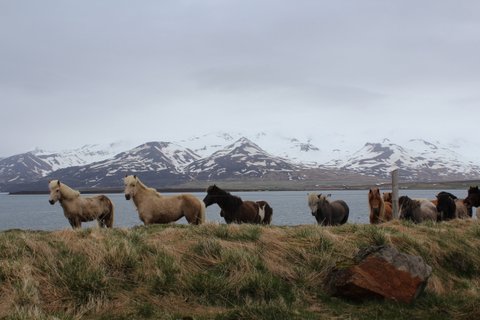
The road now led me along the western coastal edge. There's no one here except the sheep and sturdy ponies that graze narrow pastures between mountain and sea, and it was not hard to imagine how this cloud shrouded unyielding rugged land had the ancient Vikings weaving sagas of mystery and magic.
To complete the peninsular circular and return to Akureyri I have to traverse the Oxnadalur valley a fearsome looking pass between pinnacles of high black rock and snow. My now tired and cold mind and body cannot help notice that a digital temperature sign is reading 5 degrees valley and 3 degrees mountain. The average temperature in June is stated as 12 degrees. Something has clearly gone wrong!
The following day my nemesis reads 6 degrees in town. It will be colder on the plateau away from the fjord and coastal fringes, and as I ride out I can't help but think of those motorcycle compatriots who intended to camp. They must be sleeping in their riding gear to stay warm; if they haven't re-considered and found cosier shelter.
I'm heading for Lake Myvatn, a volcanic basin and unique area for bird life and for seeing the power of geo thermal energy bubbling to the surface – 'wake up and smell the sulphur'. This energy is tapped to provide Icelanders with cheap (publicly owned) electricity and heat, and at one point you can watch 100 degree steam bursting out and forming an inviting blue but highly toxic pond.
I've resigned myself to the weather, much like mountain climbers must do. But as I return to Akureyri and drop down to fjord level, the clouds lift and brighter light covers the land. I'm relieved; tomorrow is a travel day, which involves a return through the wondrous but daunting Oxnadalur valley.
John Newman
for Wemoto News
Wow - spectacular! Any comments email us at
[email protected]


